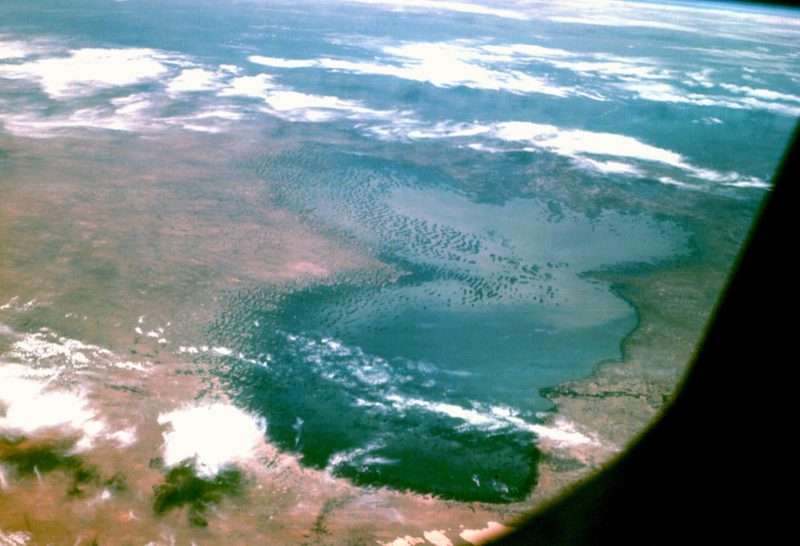The Lake Chad Basin Commission (LCBC) on Tuesday, February 27, 2018 called on the member-states of the African Union (AU) to take ownership of the project to save Lake Chad from imminent extinction.

Its Executive Secretary, Alhaji Sanusi Abdullahi, made the call at the opening of the 63rd Ordinary Session of the Council of Ministers of the LCBC in Abuja.
He underscored the need for Africa to collectively tackle challenges facing the survival of Lake Chad by demonstrating the needed political will.
He said it was an indisputable fact that Climate Change was the major cause of the shrinking of the lake and the degradation of the lands and environment, which had resulted in the loss of agricultural productivity and ecosystem.
“Africa contributes the least carbon emission that causes global warming and negative effects of climate change, but Africa suffers the most.
“Thus, it is now time for the African Union to face the challenges in the Lake Chad basin as an African strategic problem.
“The AU should factor in the restoration of the lake as part of the pan-African initiative for peace, security and infrastructural development of Central Africa, West Africa and the Sahel.
“Africa must collectively resolve to tackle these issues head-on with all we have through the strong political will of our leaders,’’ he added.
Abdullahi said that it was saddening to note that the depressed socio-economic conditions of the people in the Lake Chad basin had contributed to their recruitment by the insurgents apart from the trafficking of idle, poor and uneducated youths.
He said it was gratifying to note that there was a reduction in suicide attacks by the insurgents, adding that a large number of the insurgents were surrendering because of the intensified efforts of non-military actors.
The executive secretary, nonetheless, urged the people to remain vigilant, while cooperating with the military and other security agencies by providing information on suspicious activities in their localities.
Mr Issoufu Katambe, the Chairman of the Council of LCBC Ministers, commended Nigeria for paying its annual dues, calling on all other member-states to also contribute their quota toward the restoration of the Lake Chad basin.
He also stressed the need to find sustainable solutions to the crises in the Lake Chad basin, saying that efforts to end violent extremism would require deliberate action to solve its root causes, which included poverty and unemployment.
Katambe said that LCBC member-states ought to promote regional integration, educate all stakeholders and engage in capacity building, adding that this was a potent way of addressing the current challenges in the region.
Nigeria’s Minister of Water Resources, Mr Suleiman Adamu, said that Nigeria had been spearheading the execution of the mandate of the LCBC through the implementation of emergency programmes across the basin.
He reiterated Nigeria’s commitment to the Lake Chad restoration project through the payment of its contributions, in spite of the country’s lean budget.
He said that the commitment was also evident with the signing of the Lake Chad Basin Water Charter into law in 2017, adding that all the country’s obligations to the LCBC would be fulfilled.
The member-states of the LCBC countries are Nigeria, the Central African Republic, Chad, Libya and Niger.
In a related development, Mr Dawuda Gowon, a former Director of Federal Ministry of Water Resources, says efforts to restore the shrinking Lake Chad require political will and cooperation of countries in the Lake Chad Basin.
Gowon said this in an interview with News Agency of Nigeria (NAN), on the sidelines of the international conference on strategies to revitalise the Lake Chad Basin in Abuja.
He underscored the need for the revitalisation of the lake, saying that many people depended on the lake for their farming, fishing and livestock production, while it was also a source of water supply for drinking.
“Unfortunately, Lake Chad is shrinking due to human pressure and adverse effects of climate change, thereby reducing its size.
“Saving the lake is a big challenge that requires political will, engineering skills and cooperation of the people of the region as well as diplomacy because the project is quite enormous.
“Millions of people are living within the Lake Chad basin; they need to farm, they need to fish and the water is the only resource that would enable them to achieve all these activities.
“And that is why Nigeria is putting more efforts, trying to get the lake revitalised,’’ he said.
Gowon said that Nigeria has huge water resources, adding that what was imperative was to maximise the resources to boost the country’s development via enhanced productivity.
He, therefore, described Nigeria’s cooperation with other countries in the nascent efforts to revitalise Lake Chad as an added advantage.
Besides, Gowon stressed the need to engage qualified personnel to work in the ministry of water resources because of the technical nature of the ministry and the requirements of managing the water sector.
NAN reports that the theme of the conference is: “Saving the Lake Chad to revitalise the basin’s ecosystem for sustainable livelihoods, security and development’’.
The member states of Lake Chad Basin Commission are Nigeria, Algeria, Cameroon, the Central African Republic, Chad, Libya, Niger and Sudan.
By Tosin Kolade, Okon Okon and Peter Uwumarogie
